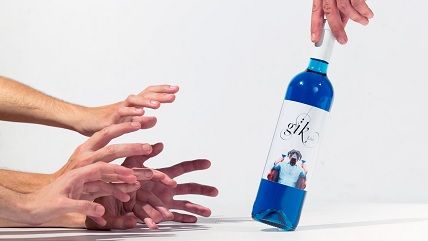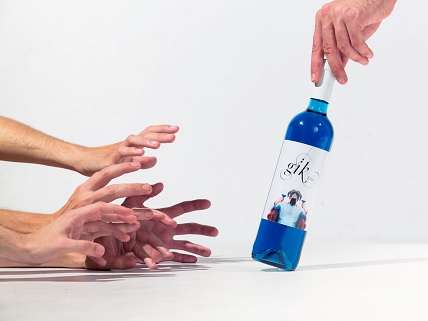Makers of Blue Wine Thwarted by EU Regulations
EU wine rules consider anything not authorized specifically to be illegal.


A group of young entrepreneurs from the Basque region of Spain who launched a new kind of blue wine in 2015 is now facing resistance from national and supranational bureaucrats. An anonymous complaint that the Spanish Wine Federation, which represents three-fourths of the country's wine producers, insists it did not file yielded a fine from Spain's agriculture ministry for violating wine regulations. The company that produces the blue wine, Gïk, has relabeled its product and added 1 percent grape must to avoid being considered a "pure wine."
"Under the European Union's oenological regulations," The New York Times explains, "whatever is not specifically authorized is considered illegal—and blue is not an approved color." Gïk has sold more than 120,000 bottles, with half being sold outside the EU, according to The Times. The young entrepreneurs who created the company had no background in winemaking, so they recruited a team of chemical engineers from University of Basque Country to develop the blue wine, which uses red and white grapes as well as a chemical from red grape skin and an organic food dye, indigotine, to achieve the blue color.
Taig Mac Carthy, one of the co-founders of Gïk, explained to The Times that they wanted to create something "more fun" for people who didn't particularly like "normal" wine. "The trouble is that we are trying to revolutionize an industry that has worked for centuries without making any change," Mac Carthy said, "and they control the rules of the game." The Spanish Wine Federation sees it differently. Their general-director told The Times that while they appreciated Gïk's initiative, "you have to respect the rules of the game, and they are for everybody."
"In Spain, wine is very linked to culture," Aritz López, another co-creator, told BBC last year. "It hasn't changed for centuries. This is a country that prefers tradition instead of innovation. But Gïk is trying to change that. We are for normal people that don't need to know thousands of rules in order to enjoy a glass."
Detailed rules on winemaking, however, are part of the EU's Common Agricultural Policy (CAP). Two-thirds of wine production worldwide occurs in EU countries, which are required to enforce laws in line with the CAP. Attempts by governments to control the rules of what constitutes what kind of alcohol aren't new, and in the case of the EU illustrate how the concept of the free movement of goods has been burdened by layer after layer of unnecessary regulation. If the Spanish Wine Federation, or any voluntary national (or even international association) would like to define wine or any other alcohol for their members, that's part and parcel of free, voluntary markets. Such rules should not be forced by government, and certainly should not be conflated with or made a condition for free trade and movement—consumers should have the freedom to decide for themselves.


Show Comments (32)